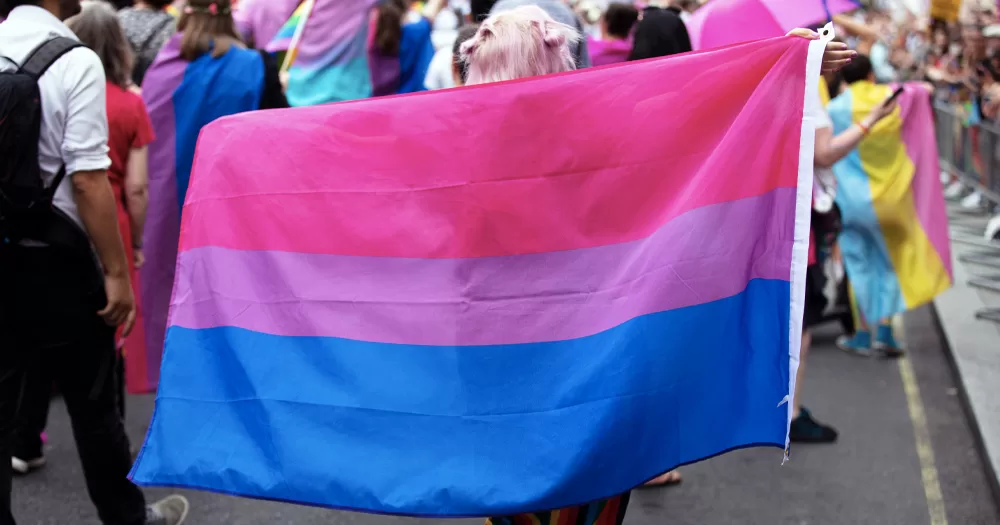As this year’s Bisexual Awareness Week kicks off today, we take a look at the forms of oppression that bisexual people experience and explore some of the ways in which we can support our peers in the face of biphobia.
If we wish to be supportive of bisexual people, the first thing we need to do is understand the particular forms of prejudice and oppression that they face. Biphobia is described as the aversion to and rejection of bisexuality and bisexual people. In order to understand how it works, we need to consider two factors that come into play:
- heteronormativity, aka the social belief that heterosexuality is the only acceptable form of sexual orientation, which is also responsible for the prejudice and discrimination faced by the wider LGBTQ+ community;
- and monosexism, a form of oppression that promotes exclusive heterosexuality or homosexuality as the only legitimate alternatives.
This two-way discrimination often causes bisexual people to hide their sexual orientation to a greater extent than their gay and lesbian counterparts. The issue is also linked to one of the main forms that biphobia can take, known as bi-erasure.
Happy Bisexual Awareness Week! ? ??
We’re celebrating all the brilliant bi+ people in our community – here’s to you! ? pic.twitter.com/TzRRLzwtfJ
— Galop (@GalopUK) September 16, 2023
Bi-erasure is the perception that bisexuality as a sexual orientation in itself does not exist and is tied to the common belief that it is only a transitional phase between heterosexuality and homosexuality. In fact, bisexuality is often perceived as a sort of “confusion” regarding sexual orientation, a phase that an individual goes through before fully understanding who they are really attracted to.
These types of prejudices are often also closely linked to gender dynamics. For example, a bisexual woman might be perceived as someone who wants to “experiment” and who is just going through a phase, but is ultimately heterosexual. Conversely, bisexual men are often told that they are actually gay, but just afraid to admit it. These biases show how our way of conceiving sexuality is strongly influenced by the patriarchal system in which we live, which is built around male pleasure and tends to reproduce everything as if we were serving it.
“I’m bi, actually.” ???
How could we celebrate #BisexualAwarenessWeek without a compilation of #NickNelson’s best #Heartstopper bi one liners? pic.twitter.com/lOtvbutygW— GAY TIMES (@gaytimes) September 18, 2023
Bi-erasure has also resulted in the lack of representation of bisexual people in movies, TV series and media in general, as well as the falsification and revision of evidence attesting to the existence of bisexuality in history.
Another common belief, which can be observed even among members of the LGBTQ+ community, is that bisexual people are promiscuous, hypersexual and tend to cheat on their partners more easily.
All these biases and misconceptions are often internalised by bisexual people, who end up having to deal with what is called “internalised biphobia”. It leads them to form negative ideas about their sexual identity and to feel inadequate because they believe they are not “queer enough” and they are just imposters.
Moreover, bi people are often put under the pressure of somehow having to justify their sexual identity and proving that they are attracted to people of different genders by providing their dating history. However, a bisexual person’s identity is still valid even if they have only always dated people of a single gender, as their partner does not define who they are generally attracted to and sexual orientation does not change once a person enters a relationship.
happy bisexual awareness week to all of you ??? you are loved and valid!! you matter!! i love all of you ??? pic.twitter.com/pFPA4PdmUn
— ryan sees louis in 15 days (*˘︶˘*).。*♡ (@genderflower) September 17, 2023
LGBTQ+ charity The Trevor Project has a guide on its website on how to support your peers who might be experiencing biphobia and how to get past your own biases. Some of the advice given includes:
- Assuming that a person is gay or straight based on their current relationship is harmful, so try to reframe your understanding that the people in that relationship could be of any gender or sexual orientation.
- Take people for their word if they share their identity with you.
- When witnessing an instance of biphobia or bi-erasure, try to address it by sharing that bisexuality is real and valid, as well as resources to learn more about bi identities.
And most importantly, if you wish to be supportive of your bi friends, try having open discussions with them and listen without assumptions and misconceptions. Check your biases and explore what the social factors are that may lead you to believe that bisexuality is not a legitimate sexual orientation and to have biphobic prejudice.
© 2023 GCN (Gay Community News). All rights reserved.
Support GCN
GCN is a free, vital resource for Ireland’s LGBTQ+ community since 1988.
GCN is a trading name of National LGBT Federation CLG, a registered charity - Charity Number: 20034580.
GCN relies on the generous support of the community and allies to sustain the crucial work that we do. Producing GCN is costly, and, in an industry which has been hugely impacted by rising costs, we need your support to help sustain and grow this vital resource.
Supporting GCN for as little as €1.99 per month will help us continue our work as Ireland’s free, independent LGBTQ+ media.
